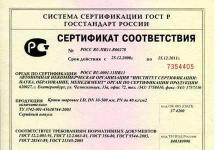Often property issues become the cause of disagreements between spouses. There are cases when a family member who earns more has a desire to purchase real estate or take out a mortgage, will he need the consent of his spouse to purchase an apartment?
Cases of acquisition of real estate by one of the spouses
Let's look at the main cases that you may encounter when buying an apartment.
Sole purchase
The purchase of an apartment for the sole ownership of a married person is possible in the following cases:
- Similar actions are prescribed in the previously drawn up marriage contract.
- The apartment is purchased using donated or inherited funds. In this case, an option is possible when one type of housing is inherited, and after its sale another is purchased.
- At the time of the transaction, the spouses no longer manage the household together. In this case, funds for the purchase of real estate are not regarded as taken from the general family budget.
Drawing up a contract without the consent of your spouse for the purchase of real estate in other cases is fraught with litigation and cancellation of the transaction.
Mortgage
When applying for a mortgage, banks will necessarily require the consent of the spouse to purchase the apartment, if the agreement does not provide for his participation as a co-borrower. Having a spouse’s consent certified by a notary to purchase real estate will act as a kind of guarantee for the bank. Firstly, this will confirm that there is no concealment of savings from the rest of the family members and the transaction is made officially. And secondly, in the event of the debtor’s insolvency, the spouse will be obliged to make payments on the loan on a general basis.
It’s a different matter if the mortgage was taken out before the marriage relationship was registered. Then, in the event of divorce, the apartment owner will be obliged to pay half of the bank contributions paid during the marriage to the ex-spouse, since the money to reimburse the loan funds was taken from the family budget. This issue can be resolved by allocating a share in favor of the second spouse if the mortgage has been fully repaid over the years of the family relationship.
The notarized consent of the spouse to purchase an apartment becomes an official document and without it there may be problems at the Registration Chamber with the registration of rights to property purchased for sole use.

You need to know that consent to purchase a spouse’s apartment certified with only one signature without proper notarization has no legal force.
To find out all the nuances and aspects of how to formalize your spouse’s consent to a specific apartment or to the purchase of real estate in general, you need to contact a notary’s office. There is no official form or strict rules for registration as such for consent. The only thing is that the spouse’s notarized consent to purchase real estate should be called “Consent” and printed to give greater credibility to this document.
Also, the document should clearly indicate the details of the spouse - full name, date of birth, series and number of the passport, when the document was issued and by whom, as well as identification number, citizenship and residential address. Next, you need to specify the conditions for purchasing the apartment. As a rule, they write down exact data or a general wording that “you trust your spouse to choose the apartment, price, seller and other conditions.”
The last line is the date, surname with the initials of the spouse and signature. Do not forget that all numbers, from the apartment number to the cost, must be additionally duplicated in words.

The cost of a notarized consent is usually about 1000 rubles. The amount may vary slightly taking into account possible additional conditions. The validity period of a spouse’s consent to purchase an apartment is not regulated by law. However, for public services, the consent of the spouse when purchasing real estate, issued more than 3 years ago, is not considered valid. If the limitation period is indicated at the notary's office, then it is usually 1 year from the moment the consent is signed.
Power of attorney
The question often arises among married couples whether the consent of the spouse is needed to purchase an apartment when the transaction is made by proxy. If a husband or wife acts on behalf of a second family member under a power of attorney issued to him, the notarized consent of the spouse to purchase an apartment is not required at all. Then it is officially considered that the authorized person is aware of the fact of the transaction being performed and, with his signature, confirms his consent to carry out such an operation.
If on behalf of one of the representatives of the family couple, by proxy, an apartment is purchased by a third party, for example, a realtor, then in this case the consent of the second spouse is required. There are cases when the spouse himself acts under a power of attorney issued in the interests of a third party in his name. Is the consent of the spouse required to purchase an apartment in this case?

The reasonable answer is no, since the apartment does not become the property of the spouse, but is acquired for the benefit of another person. The price of a regular power of attorney is about 500 rubles. The cost of a general power of attorney can reach 2,000 rubles.
The consent of the spouse to purchase an apartment is required in most cases. There are exceptions, however, as always. They were also stated at the beginning of the article. We hope the article helped resolve the issue.
The legislation of the Russian Federation protects the property interests of individuals, including in the context of jointly acquired property, by requiring spouses to make mutual decisions when making real estate transactions.
If the sale of a jointly acquired land plot, house or apartment requires the mandatory permission of the spouse, then when purchasing the question is not posed so clearly. Among experts working in the real estate market, there are mixed opinions on this matter.
On the one hand, financial resources invested in housing registered in the name of one of the spouses are recognized. On the other hand, the husband and wife are expected to make investment decisions jointly.
In addition, regardless of which family member it is registered in, in the event of a divorce the apartment is considered common property, which presupposes its division and indicates the preservation of the property rights of both parties (see).
But the theoretically envisaged results often do not become actual. Since disputes arise in practice on this issue, leading to protracted conflicts, lawyers agree that the spouse’s permission during the purchase will not only not be superfluous.
In some cases, this is the only mechanism to guarantee the rights of the buyer.
Legislation
Since September 2009, a rule has been established to require permission from a second family member not only when transferring an object, but also when purchasing it.
The rule was established on the basis of the provisions of the Civil and Family Codes of the Russian Federation that transactions with real estate of married persons are permissible only by mutual agreement (Article 253 of the Civil Code, clause 2 of Article 35 of the Family Code).
Since March 2013, the requirement for provision was abolished by the provision of the Federal Law of December 30, 2012 No. 309-FZ, which influenced the abolition of Articles 558 and 560, 574, 584, which determined the conditions for registration of a sales contract and were directly determined by the registration procedure.
It is important that the cancellation is associated only with the termination of registration of the property agreement. This basis does not allow the cancellation of the provision on mutual information, on financial investments and property acquisitions of legally married persons.
The law assumes that these requirements are strictly observed, as regulated by the institution of family and marriage.
In case of violation of these, the following come into force:
- clause 7 of article 8.1 of the Civil Code of the Russian Federation;
- Clause 6 of Article 12 of the Law on the State Tax Committee;
- Clause 2 of Article 28 of the Law on the State Tax Committee.
These provisions allow for the operative suspension or termination of the acquirer's property rights, subject to a statement by the interested party of a violation of his civil and constitutional rights through a personal petition or by a court decision.
Legal consequences of not providing
Based on legal norms, a husband and wife agree to purchase real estate orally, which allows for the investment of family capital in this project.
It is worth considering that the person alienating the property in their favor knows about the decision made only from the words of the person registering the property.
If within a year the wife (husband) finds out that funds from the personal account have been spent without her consent, she can easily initiate legal proceedings.
In addition, if a wife finds out several years after purchasing an apartment that it was acquired secretly and given as a gift to another woman or a child from her first marriage, etc., the court has the right to do so regardless of the statute of limitations.
Such cases are not isolated. The main victim in such situations is the home seller. It is likely that during this period he will already dispose of the funds received.
You should not lose sight of the fact that the knots of family problems can also bind third parties who are unaware of it.
There is only one way out - to obtain the spouse’s consent to the transaction from the buyer.
This paper will solve all potential problems by rejecting subsequent claims to the legal validity of the transaction.
Unflattering consequences will follow if the transaction was carried out with violations or the object did not have legal capacity due to:
- encumbrances;
- arrest; (cm. )
- and so on.
In these cases, the violations committed by the buyer characterize his bad faith. The lack of permission allows for an unnecessary reason to state this fact. That is why the buyer is advised to be careful when purchasing.
In what cases is the consent of the spouse to purchase real estate not required?
Some type of right to financial funds in the account of citizens is determined by their property. The law allows them to be spent at the discretion of the owner, including on housing, land and other types of property.
- Money accumulated and deposited into a personal account before marriage.
- Proceeds from the sale of real estate and other property owned before marriage.
- or received from the sale of property inherited by a citizen, regardless of marital relations.
- Donated money and received from the sale of donated valuables.
Such facts of the origin of finances should be documented. Citizens have the right to dispose of them independently.
If upon entering into marriage a marriage contract was concluded, which states that the husband or wife has the right to manage the general budget without information, or it is established that he has the right to purchase real estate at his discretion, no additional permissions are needed.
If property was divided after a divorce, citizens use it at their discretion. If the division is not documented, but more than 3 years have passed since the divorce, the same.
Separately, it is worth paying attention to transactions in which the husband formalizes the purchase of real estate in his wife’s name (and vice versa). Such precedents obviously indicate interaction between the parties, which does not require additional confirmation.
Sample consent form and validity period

Mostly, citizens draw up this type of documentation in a notary office.
It is drawn up according to a standard sample based on the application of the husband or wife, upon presentation of a passport and marriage certificate, which provides a 50% discount.
Despite the uniformity of standard forms, in this case it is permissible to provide nuances:
- The document provides for use in real estate transactions simultaneously during purchase and sale. In this case, the phrase is formulated: “for the sale/purchase of real estate.”
- Compilation deadlines that can be varied. A permit can be drawn up for one specific transaction, for 1 year, 3 years, or without specifying a period.
In rare cases, it is indicated that the consent is valid indefinitely. According to the rules, such civil legal relations are permissible and are valid until the consent given by the citizen is revoked. The same criteria, but with some criticism, apply to documentation without an expiration date.
The main thing is to be clear:
- Who gives consent to participate and to whom, indicating passport details.
- That citizens are in a legal marital relationship, confirming this fact with information from the marriage certificate, indicating the date and place of marriage.
- That a marriage contract was not concluded between them, repealing the Civil Code of the Russian Federation and the Investigative Committee of the Russian Federation.
- Which object is being discussed, or preferences in choosing an object are indicated.
In such cases, it is permissible to indicate only the amount allowed for investment in housing, or the locality where purchase is preferred. Sometimes a clause is included about actions that are completely entrusted to the buyer, without restrictions.
It is advisable to highlight the characteristics of interest to a family member separately, and with regard to the accompanying choice, allow actions at his discretion.
In conclusion, you need to put a signature with a transcript and the date of compilation.
 Preference is given to documentation that is drawn up by a notary and certified by him. If the permission is drawn up in simple written form, by hand, but in the presence of the counterparty to the transaction, it will play a positive role.
Preference is given to documentation that is drawn up by a notary and certified by him. If the permission is drawn up in simple written form, by hand, but in the presence of the counterparty to the transaction, it will play a positive role.
The spouse who gives consent must go to the notary's office. He provides a passport, marriage certificate and receives an application form to fill out. Having filled out the form, he signs in the presence of a notary and deciphers the surname with his own hand.
Based on the application, a document is drawn up on a form with security watermarks and issued against signature.
A handwritten permit does not acquire the same legal force. It must be drawn up in the presence of the interested person, upon presentation of a passport and marriage certificate, in order to avoid forgery and fraudulent actions on the part of buyers.
Such documentation is not required from citizens who have not officially registered their relationship.
It is permissible not to discuss their property transactions and act at their discretion.
The disposal of both funds and property received by spouses during the period of cohabitation has its own nuances, especially if there is no prenuptial agreement.
That is why many couples are on the verge of asking the question, in what cases is the consent of the partner required and for what types of property is it mandatory?
Legislative aspect of the issue
 It would seem that modern family legislation should have been ideally perfect, given that it was formed over more than 14 centuries. Meanwhile, legal inconsistencies, as well as ambivalent interpretations, are still present in the RF IC to this day. In particular, on based on Article 35 of the RF IC all property acquired during marriage, including money, is shared by default, of course, if the spouses have not bothered in advance about drawing up a marriage contract or an agreement on the use of common property, as well as recognizing some objects as personal.
It would seem that modern family legislation should have been ideally perfect, given that it was formed over more than 14 centuries. Meanwhile, legal inconsistencies, as well as ambivalent interpretations, are still present in the RF IC to this day. In particular, on based on Article 35 of the RF IC all property acquired during marriage, including money, is shared by default, of course, if the spouses have not bothered in advance about drawing up a marriage contract or an agreement on the use of common property, as well as recognizing some objects as personal.
Therefore, if a husband wants to purchase an apartment, it is not necessary to have the consent of the other half, given that within Part 2 of Article 35 of the RF IC it is believed that the transaction is already being carried out with the tacit permission of the wife. At the same time, in force part 3 According to this article, the absence of written consent can bring a number of negative consequences, which will result in the transaction being subsequently contested in court at significant costs if the woman suddenly decides that her interests have been violated.
Of course, to cancel it will be necessary to comply with a number of formalities provided for by law, in particular, to prove a deliberate violation of the rights to dispose of joint property. But, nevertheless, there is a precedent Article 35 of the RF IC has already been created in view of the fact that the situation can be interpreted and, accordingly, applied in two ways, which naturally leads to a lot of difficulties and certain risks for both the seller and the buyer.
When necessary
In the process of buying an apartment, special difficulties when interpreting Article 35 of the RF IC arise precisely in relation to clause 3, which states that all transactions subject to state registration must accompanied by the notarized consent of the second spouse. Meanwhile, it is the purchase and sale agreement that is in force Federal Law No. 302 after March 1, 2013, it is not necessary to register, although this document is part of the main package of documents that are already presented to Rosreestr.
 That is, from a legal point of view consent is not required, but it may be needed
in the following cases, if:
That is, from a legal point of view consent is not required, but it may be needed
in the following cases, if:
- The issue of buying an apartment has already been discussed by the couple and one of them is categorically against it;
- it is supposed to use the money that is earned together, and, of course, there are other plans for the money earned;
- funds are spent that the spouse earned during the marriage, but hid, thus depriving his half of the opportunity to dispose of them within the framework of joint property.
That is, consent will only be required in cases where there is a possibility of challenging the transaction within the framework of Part 2 of Article 35 of the RF IC, which, by the way, is confirmed by judicial practice, which, of course, is not extensive due to the complexity of forming an evidence base, given that spouses, as a rule, resolve disagreements pre-trial, but positive decisions still there is.
But in all other cases Spouse's consent is not required, especially when it comes to the following situations:
- purchasing an apartment in shared ownership;
- if there is a marriage contract or an agreement on the procedure for using joint property;
- notarized power of attorney to represent interests in the acquisition of real estate.
Although it is still advisable to conclude an agreement, given that in this way you can avoid risks when challenging the deal later, especially if you don’t like the apartment and the wife changes her mind, or the family goes into divorce mode, where all means of dividing property and increasing their own share are good . 
Significance of this document
 Despite the fact that the spouse’s consent to purchase an apartment is not required by law, the importance of this document cannot be underestimated. In particular, both buyers and sellers, by virtue of the law, can be both bona fide and dishonest parties to a transaction, that is, those who deliberately hide certain information that can change the decision to execute a transaction, or who initially advocate for the purity of the transaction.
Despite the fact that the spouse’s consent to purchase an apartment is not required by law, the importance of this document cannot be underestimated. In particular, both buyers and sellers, by virtue of the law, can be both bona fide and dishonest parties to a transaction, that is, those who deliberately hide certain information that can change the decision to execute a transaction, or who initially advocate for the purity of the transaction.
Accordingly, if a couple wants to avoid difficulties in the future, especially if there is a possibility of divorce or if the residential premises are registered not as shared ownership, but as personal property for one of the couple, it is advisable to formalize consent, thus acting as bona fide buyers. If the spouses are confident in their future together, consent is not required.
It is also advisable to formalize the consent of the other half if in the process of purchasing an apartment third party funds are involved, that is, that loan from a bank or a loan from a mother-in-law, to whom the money will have to be repaid from the common capital and over a long period of time, despite the mutual “love and respect” for the mother.
Registration procedure
Of course, even in the absence of an agreement, as well as registration of ownership of only one spouse, the apartment will still be considered common, but disputes may arise during the next payment of the same scheduled loan payment.
That is why, on the eve of such a significant purchase for the family It is advisable to visit a notary at the place of official residence of the couple.
 At the same time, the spouses it is necessary to prepare certain documents, in particular:
At the same time, the spouses it is necessary to prepare certain documents, in particular:
- passport or other identification document;
- marriage certificate;
- , of course, if it is available.
It should be noted that presence of a marriage certificate will be mandatory, given that joint management of funds involves only an officially registered marriage. If the couple cannot prove the fact of entering into a marriage relationship through the registry office, the notary will not have the right to issue consent on the basis of data that is not documented.
Another rule for obtaining consent is personal presence of the party, which expresses approval, because when drawing up the specified document, the notary is obliged to certify not only the legal fact of voluntary will, but also the personal signature of the participant in this type of legal relationship.
By the way, agreement form The notary will issue it to the spouses at the office, although the application can be drawn up independently, given that there is no form approved by law. However, in view of the fact that a document drawn up with violations will not be certified, it is better to use the services of a notary initially, given that few ordinary citizens have deep legal knowledge and are able to draw up the agreed form correctly.
At the same time notarization process Consent may take from several hours to several days, depending on reception hours and the workload of the office. But the powers of the specified document will apply only to one piece of real estate, the purchase of which will take place over the next few days. 
Form of compilation and content
As a rule, the consent form is folded only from master data, reflected in the regime of standard requirements for the mentioned form. In particular:

Then, naturally, follow the details of the notary and his signature with a seal, as well as the registration number of the document being certified.
Validity
 Unfortunately, the law is not perfect, and there are many gaps in it that have not yet been resolved; this type of blank spots includes the validity period of consent to purchase an apartment. Of course, if a couple has a preliminary agreement in hand, even without a final execution date, by virtue of Article 429 of the Civil Code of the Russian Federation, the apartment must be purchased no later than 12 months from the date of execution of the specified document. If there is no agreement in writing, the spouses can set the duration of the consent yourself for the purchase of real estate.
Unfortunately, the law is not perfect, and there are many gaps in it that have not yet been resolved; this type of blank spots includes the validity period of consent to purchase an apartment. Of course, if a couple has a preliminary agreement in hand, even without a final execution date, by virtue of Article 429 of the Civil Code of the Russian Federation, the apartment must be purchased no later than 12 months from the date of execution of the specified document. If there is no agreement in writing, the spouses can set the duration of the consent yourself for the purchase of real estate.
It is worth noting that this document cannot be indefinite, given that it is impossible to sell an apartment at the same address for a long time, this is why many lawyers are guided by the base date, similar to a power of attorney, which can be concluded for a period not exceeding a year.
Price
Many spouses avoid drawing up an agreement because it involves significant costs, and yet the average price in 2019 will be a total of about two thousand, based on the following expenses:
- prices for document preparation;
- consultations on the procedure for registering the procedure for purchasing an apartment;
- mandatory payment approved by the notary chamber under Law No. 4462-1.
To learn about situations in which it is necessary to obtain consent to purchase real estate, see the following video:
Spouses who have previously entered into a legal marriage can equally dispose of common property. Such relationships and property fall under the legally designated concept of joint property of spouses.
If the question concerns some household needs, for example, repairs or rearrangement of furniture, then this cannot entail legally significant consequences. Things are completely different when the question concerns real estate and any transactions made with it.
It is important to understand that the article describes the most basic situations and does not take into account a number of technical issues. To solve your particular problem, get legal advice on housing issues by calling the hotlines:
Such relationships are regulated by law, which states that when concluding various transactions related to jointly acquired property, it is mandatory to notify the second spouse and also obtain his consent.
Jointly acquired property includes those things and real estate that were acquired after marriage and before the dissolution of the marriage. Even if the acquired property is registered in the name of one of the spouses, the second still has the right to half of this area. The same can be said about the rest of the property.
Any citizen can challenge his rights regarding jointly acquired property in court.
Spouse's consent when purchasing an apartment
In paragraph 3 of Art. 35 of the RF IC states that spouse's consent to purchase an apartment necessary, otherwise the buyer may be denied further registration of real estate only for the reason that his spouse did not give permission to purchase the living space.
The legislation states that all documents related to the registration or re-registration of real estate require the consent of the spouse, drawn up and certified by a notary.
If the second spouse did not give his permission, then no later than a year from the date of discovery of the fact of deception, he can file a claim to declare the transaction invalid.
In order for the consent to have legal force, the second spouse must draw it up in his own hand and have it certified by a notary. Consent is not issued in the form of a certificate, but in the form of a special agreement. Sample of spouse's consent to purchase an apartment can be obtained from a notary office. You can view and download here: . The cost of a spouse's notarized consent to purchase an apartment varies from 500 rubles. To complete the document, you will need the passport of the second spouse and his personal presence.
Consent of the spouse when registering ownership rights to the apartment
The law stipulates when consent is not required:
- if real estate is purchased in non-residential stock;
- if housing is registered as;
- if the living space is purchased in shared ownership (for example, half of the living space belongs to the spouse, and half to the spouse);
- If the purchase of housing occurs under a power of attorney from a third party, then the consent of the spouse of the trustee is not required.
In all other cases, it is best to formalize an agreement from the second spouse. The paper is drawn up in writing and it clearly states for which premises consent is given. The document also indicates the address of the living space, details of the person giving consent, and the validity period of the consent, if necessary. If consent is given in favor of a future purchase, the document specifies the territory where the second spouse allows the purchase of housing.
Consequences of lack of consent of the second spouse
Is it necessary to notarize a spouse’s consent to purchase an apartment?? This question cannot be answered unequivocally, but the presence of such a document confirms the honest intentions of the family regarding the purchase of an apartment. This issue is especially relevant when concluding a transaction with “problem” real estate. The agreement confirms that neither spouse colluded with the scammers and will not challenge the deal in the future.
However, there are situations when the spouse deliberately does not inform the other half. Such a deal can be challenged during a year from the moment the fact of fraud is discovered.
Sometimes you may encounter a situation where the second spouse is categorically against spending accumulated funds on purchasing an apartment and wants to buy a house or the second spouse does not like the chosen apartment. In such cases, the spouses need to come to a compromise, otherwise the completed transaction may be challenged.
The most popular questions and answers to them regarding the consent of the second spouse to purchase an apartment
Question: Hello. My name is Ivan. Please tell me what to do. The fact is that I was married to my wife about 7 years. A year ago I got divorced, leaving the apartment to my ex-wife. While still married, but no longer living with my wife, I purchased an apartment because I did not have my own home. When I applied to register ownership of my home, I received a refusal, which stated that since I purchased the home while still in a marital relationship, my ex-wife must provide written consent to purchase the apartment. Is this refusal legal, and what actions should I take if my spouse refuses to sign the consent?
Answer: Dear Ivan, the refusal you received is legally binding. This is due to the fact that everything acquired in an official marriage is jointly acquired property. Such relationships are regulated clause 3 art. 35 IC RF. Thus, you will have to provide an agreement from your ex-spouse, otherwise you will not be able to register ownership of the property. If your ex-wife refuses to provide such consent, you can challenge the situation in court.
Example of the consent of the second spouse to purchase an apartment
Entrepreneur O. acquired ownership of the property, but did not inform his wife. The entrepreneur's wife received the money he spent on buying an apartment as a gift. O. informed his wife that he had deposited the entire amount in the bank as a deposit.
A few months later, O.’s wife found out about what had happened and filed a statement of claim in court demanding to challenge the transaction, since when purchasing an apartment, the spouse’s consent is required.
The court found the claim to be justified and ruled in favor of citizen O. The transaction was canceled, and entrepreneur O. was required to return the entire amount spent to his wife and pay moral damages to the injured wife.
Conclusion
In conclusion, a number of theses can be formulated:
- Jointly acquired property can include household items, equipment, jewelry, paintings, and real estate.
- Regardless of who is the owner, spouses have equal rights to real estate acquired during marriage.
- Such relations are regulated by Art. 35 of the Family Code of the Russian Federation.
- If a real estate transaction is finalized, the first spouse must notify the second spouse about it and obtain his notarized spouse’s consent to purchase the apartment in writing.
- The agreement is drawn up in writing and must be certified by a notary.
- To complete the document, you will need the personal presence of the second spouse and an identification document.
- In the absence of such paper, the other spouse has the right to challenge the transaction due to his disagreement no later than a year after the discovery of the fraud.
- A document confirming the permission of the second spouse may not be required only in three situations specified by law.
- In the case of buying an apartment, the consent of the second spouse is a fact confirming the serious intentions of the buyers and the absence of their collusion with scammers.
- The presence of consent confirms the will of the spouse regarding the investment of jointly accumulated funds, thereby not violating his rights in relation to jointly acquired property.


























